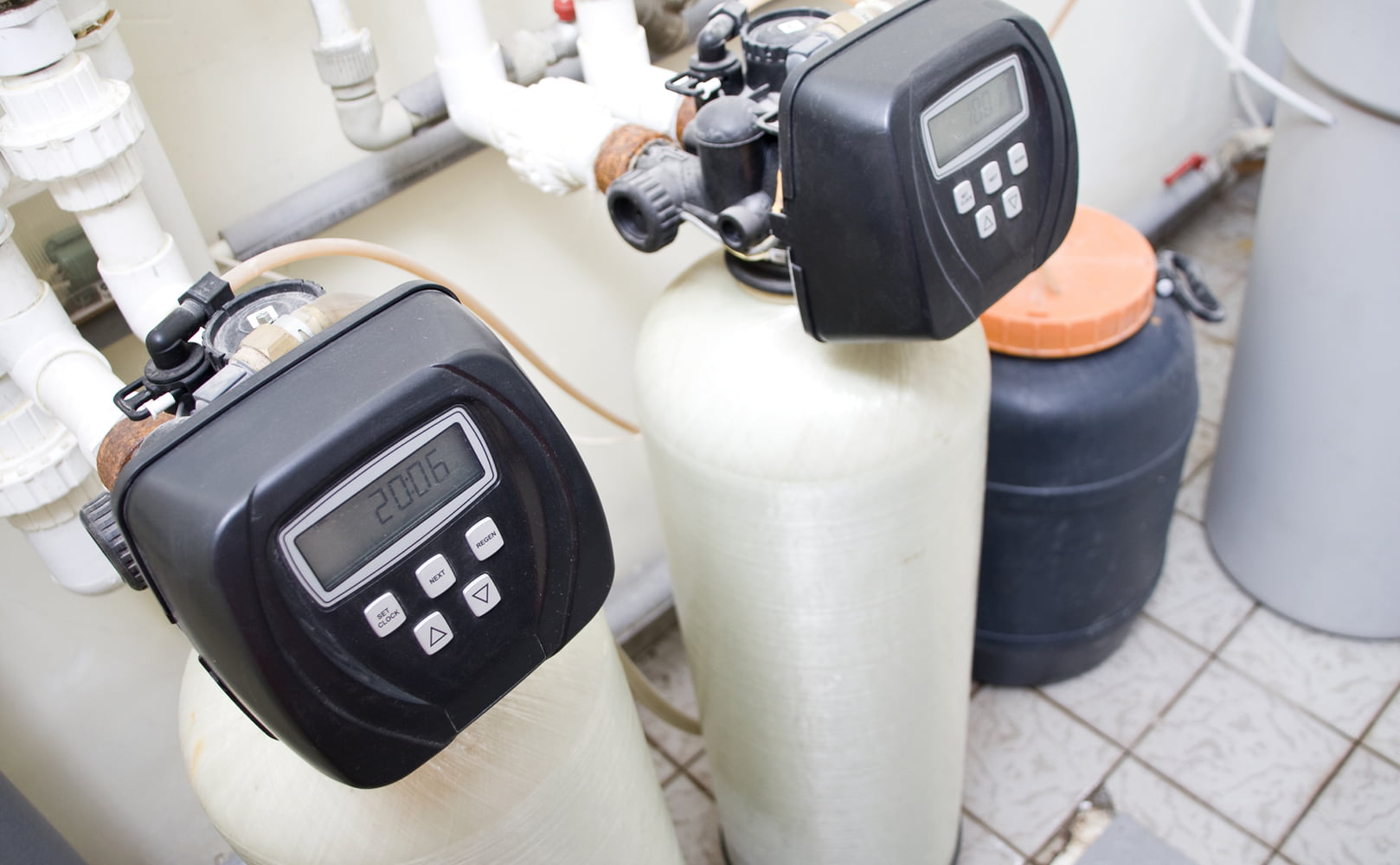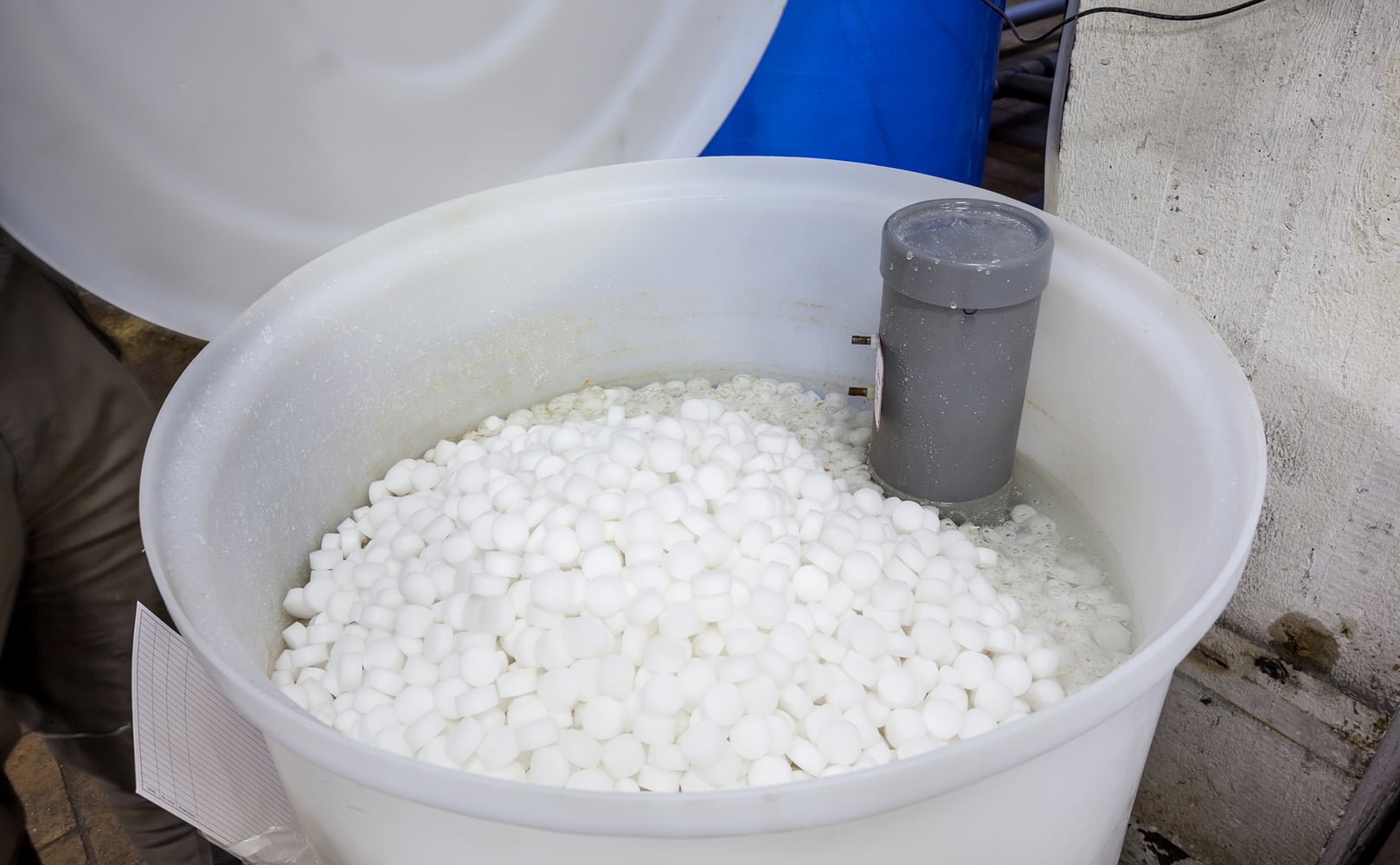Whole House Reverse Osmosis vs Water Softener
Written by: Alexandra Uta // Last Updated: Feb 14, 2023
This page may contain affiliate links. If you buy a product or service through such a link we earn a commission at no extra cost to you. Learn more.
If you’re concerned about the water quality in your home, then installing a whole house water treatment system is probably on your radar.
Both reverse osmosis systems and water softeners work well for treating your home’s water supply, but they have different functions.
Whole house RO systems are highly effective water purifiers that remove a broad spectrum of contaminants. Water softeners on the other hand condition your water – transforming it from mineral-rich hard water to less destructive soft water.
Let’s take a closer at how these water treatment systems operate – so you can choose which one is right for you.
Key Takeaways
- Both whole house reverse osmosis systems and water softeners treat the water supply to your entire home, but that’s where the similarities end.
- Reverse osmosis systems are water filters that remove a broad range of harmful contaminants – leaving you with clean, healthy, neutral-tasting water.
- Water softeners are designed to condition your water – transforming it from mineral-rich hard water to soft water via ion exchange. Soft water is much easier on your home pipes and appliances.
- Whole house reverse osmosis systems can be used in conjunction with water softeners to extend the RO system’s lifespan. While RO systems can soften hard water, the process will prematurely age the membrane, so they’re not the ideal solution for water softening.
Whole House Reverse Osmosis vs Water Softener – What’s the Difference and Which Is Better?
So, whole house reverse osmosis vs water softener, which one is better?
Whole house reverse osmosis systems and water softeners sometimes get lumped together when discussing water treatment, but they really shouldn’t. Each system has its purpose, and while there is some overlap, they can’t be substituted for one another.
What Is a Whole House Reverse Osmosis System?
A whole house reverse osmosis system is simply an RO system installed at the point of entry water supply to your entire house. This means it will filter all the water flowing into your home, including, showers, toilets, and bathroom sinks.
Reverse osmosis filtration works by forcing unfiltered feed water through a semipermeable membrane to capture contaminant particles down to just .0001 microns. It will also remove chlorine/chloride, pesticides, nitrates, VOCs, heavy metals, and even microbial pathogens.
Reverse osmosis is a highly effective water filtration method, but it’s not the ideal method for transforming hard water into soft water.
What Is a Water Softener?
A water softener is designed solely to soften water. Like whole house RO systems, they’re installed at the water supply to the entire home, so all of the appliances and fixtures in your house will be supplied with soft water.
Water softeners work by replacing magnesium and calcium ions (hard minerals) with sodium ions (soft minerals). This serves to soften the water – making it easier on appliances and reducing scale buildup in your pipes, faucets, and fixtures.
Which One Do I Need?
Which system you need depends entirely on the condition of your water.
If your area has hard water, then a water softener will extend the lifespan of your entire plumbing system. However, this is all a water softener does. Aside from some iron, it won’t filter anything else out of your water, so shouldn’t be considered a substitute for a dedicated water filter.
If you’re concerned about water quality and potential contamination, then a reverse osmosis system is the way to go. These filters are highly effective and target a wide range of contaminants, so you can be confident your water quality is top-notch.
Keep in mind whole house RO systems filter the water supply to your entire home rather than just your drinking water. This can be overkill in some applications, so you’ll want to consider whether you need your shower/toilet water etc. filtered or can get away with an under sink RO filter.
Can I Use Both a Whole House Reverse Osmosis System and a Water Softener?
Combining a whole house reverse osmosis system with a water softener is not only possible, but it’s often necessary to keep the RO system working efficiently.
While RO systems will remove minerals from water, they aren’t the ideal system for softening water. Hard water is tough on the RO membrane and will age it prematurely.
In fact, that’s why water softeners are often installed before whole house reverse osmosis systems – to extend their life.
And, as mentioned, water softeners are also effective at removing traces of iron from your water, which could damage the RO membrane, too.
What Are the Benefits of Using Whole House Reverse Osmosis? Why Get One?
Better Tasting Water
RO water is exceptionally clean and neutral tasting, as the reverse osmosis process removes nearly all contamination. The difference between RO water and tap/well water is immediately noticeable, as the filtration process removes chlorine and other chemicals that can give water an unpleasant taste.
Advanced Filtration
When it comes to home filtration, RO systems are unquestionably one of the best options on the market. They remove an incredible array of contaminants – up to 99.9% of lead, arsenic, chromium-6, nitrates, pesticides, chlorine/chloramine, disinfection byproducts, and so on.
One of the reasons why they are so effective is that, aside from the RO membrane, almost each system uses various pre and post-filters like activated carbon and a sediment filter.
Health Benefits
In addition to being clean and neutral tasting, RO water is free of harmful contaminants that have known negative effects on your health.
Ingesting lead will increase your risk of kidney damage, high blood pressure, nerve disorders, memory loss, anemia, and nerve damage. And that’s just one potential contaminant out of many.
Cost Savings
While whole house RO systems aren’t cheap to install and have significant maintenance costs, they will still save you money in the long run when compared to purchasing bottled water. They’ll also save you money when it comes to the longevity of your appliances, as soft filtered water is easier on pipes and appliances than hard water.
What Are the Benefits of Using Water Softening? Why Get a Water Softener?
Low Maintenance
In comparison with whole house RO, water softeners require very little maintenance. The only regular maintenance required is topping up the sodium ions to keep them at optimal levels and periodic cleaning of the resin bed and valve.
Saves Water
A water softener wastes less water when compared to RO systems – which generate “wastewater” as a part of the filtration process. The only water wasted by a water softener occurs during the periodic regeneration, which is way less than an RO system does.
Appliance Lifespan
Soft water will increase the lifespan of your water-consuming household appliances, including your dishwasher, washing machine, electric kettle, and iron. Hard water will cause mineral deposits to buildup in these appliances, reducing their efficiency and increasing the need for regular maintenance.
Soft water can double the lifespan of your home appliances when compared to hard water. This translates to significant cost savings over the long run – as washing machines and dishwashers aren’t exactly cheap to replace.
Prevent Limescale
Limescale is a hard chalky deposit mainly consisting of calcium carbonate. If you live in an area with hard water you’ll notice this buildup in kettles, bathtubs, and sinks.
Limescale not only looks unsightly, it seriously impairs the operation of plumbing and heating components.
Luckily, installing a water softener will prevent any future limescale buildup.
Water Heater Efficiency
One benefit you may not have considered is your water heater’s efficiency.
When you have significant limescale buildup in your heater and pipes, the heater has to work extra hard to heat your water. The heater has to heat the limescale before it can heat the surrounding water, which means you’ll end up using far more energy to heat your home than is otherwise necessary.
Improved Taste
Lastly, water softeners can improve the taste of drinking water. While this isn’t universally true – and some people prefer the taste of hard water – soft water is more neutral tasting and can work better for making tea, coffee, or cooking with.
Is RO Water Hard or Soft?
Reverse osmosis removes a large percentage of the minerals contained in water, so it will soften your water.
RO systems aren’t optimized for this, however, so constantly filtering hard water through an RO membrane will wear it out fast. This is why installing a water softener in conjunction with an RO system works so well in regions with hard water.
If you have any questions about whole house reverse osmosis vs water softening please don’t hesitate to leave a comment below!
Information provided on BOS is for educational purposes only. The products and services we review may not be right for your individual circumstances.
We adhere to strict editorial guidelines. Rest assured, the opinions expressed have not been provided, reviewed, or otherwise endorsed by our partners – they are unbiased, independent, and the author’s alone. Our licensed experts fact-check all content for accuracy. It is accurate as of the date posted and to the best of our knowledge.



